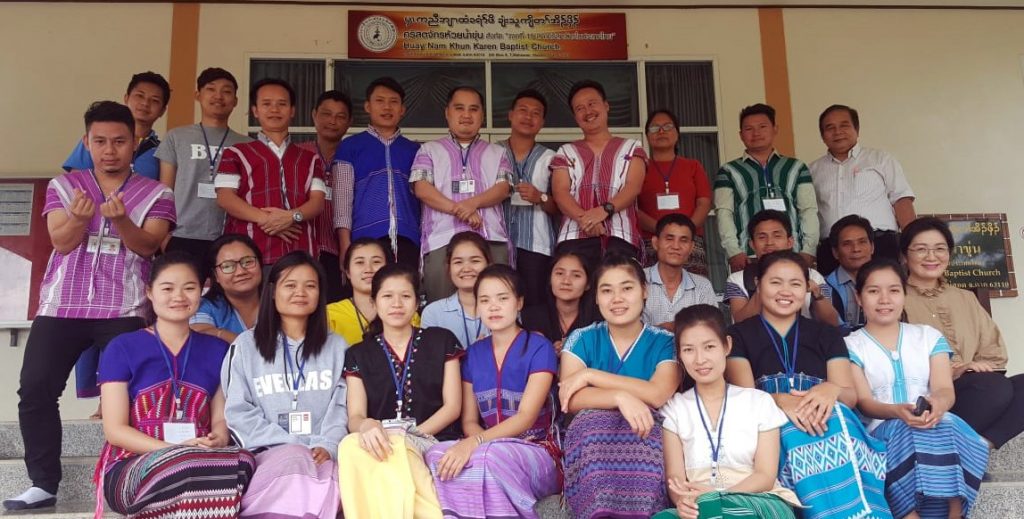CCA Organises Ecumenical Theological Education Training for Teachers of Bible Schools in Refugee Camps

As part of the Christian Conference of Asia’s (CCA) initiative of facilitating ecumenical formation at the grassroots, CCA organized the fourth ecumenical theological training for teachers of six Bible Schools located inside refugee camps on Thailand-Myanmar border.
The training is being held from 6 to 10 November 2018 at the Hill Light Theological Seminary located inside of a refugee camp at the Huay Nam Khun Karen village, near Maesot, a small township in west Thailand close to the Myanmar border.
During the first three days’ sessions the participants reflected on the concept of wider ecumenism and ecumenical movement in Asia, interconnection and relevance of Missio Dei in Karen context, critical and contextual reading of the Bible from the Karen perspectives, construction of Karen Diaspora theology and the future of theological education of Karen refugees and stateless people.
The Bible schools in refugee camps provide education facilities, which is the higher level education they can undergo while being confined inside the refugee camps. Many students enroll for three-year theological courses managed and run independently by refugees themselves through six Bible schools inside the refugee camps.
Most Myanmar refugees and undocumented migrants are the Karen ethnic people who have fled armed conflicts and persecution in Myanmar.
Although Karen refugees have lived in the camps for more than thirty years, they live only in temporary shelters inside the camps
The Karen Christians have maintained their strong sense of Karen ethnicity and Christian faith. They built their churches and Bible schools inside the refugee camps.
While sharing their experiences, the participants expressed their concern on the recent decision by the Thai government and UNHCR to close down all refugee camps on the Thailand-Myanmar border before the end of 2019.
Though Karen refugees were forcibly displaced from their homeland and settled in camps, they have made consistent efforts to maintain their dignity and hope. However, the Bible schools in six refugee camps are seriously concerned about the decision to close-down of the camps.
The Kwathoolei Karen Baptist Bible School(KKBBSC) which is the oldest and biggest Bible school in Maelah Refugee camp is exploring a possibility to build a new campus in Myanmar, but no initiative has been taken yet to concretize the plan.
“Many of us were born in the refugee camps and have never been to Myanmar. We suffer due to the serious confusion of our identity; we will not be welcomed in Myanmar as we are stateless aliens in Thailand”, stated the Academic Dean of KKBBSC Dr. Alwyn. ,
“Now we do not know where to find our new home. We need to be independent and develop our capacities to realize our visions for the Karen community. We trust God’s mercy and guidance for the whole Karen people including the Karen diaspora”, Alwyn added
Rev. Dr. Ngurliana told the Bible school teachers, “Jesus Christ was a refugee, who was excluded, marginalized, and persecuted. We all follow the same Christ who lives in our midst and we need to believe that Jesus Christ is in complete solidarity with the Myanmar refugees, who are excluded, marginalized, oppressed and persecuted by the powers and principalities. .”
“God of Ebenezer will always be with you and guide you in your struggle and journey”, Rev. Grace Moon told the participants during the opening session.
Thirty-five Bible school teachers from six refugee camps are participating in the fourth training programme annually organised by CCA since 2015.
The training was facilitated by CCA staff members Rev. Dr. Ngurliana and Rev. Grace Moon together with Dr. Thra Tee Toh, Director on Mission of Kawthoolei Karen Baptist Churches, Dr. Wado and Dr. Alwyn of KKBBSC, Dr. Yenyen, the Principal of Hill Light Theological Seminary, and Dr. Saw Shwe Gyan, Dean of Karen Baptist Theological Seminary.










